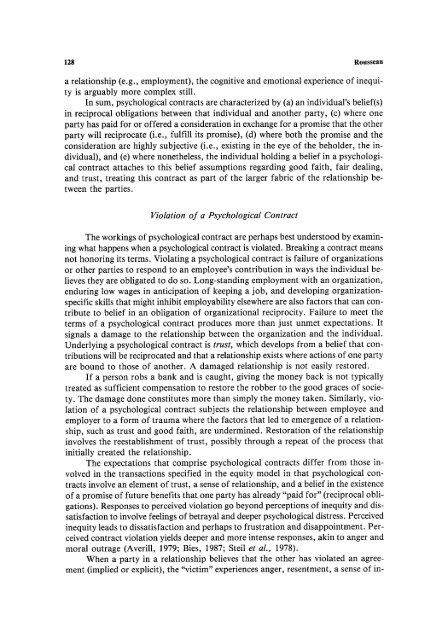Psychological and implied contracts in organizations d.m. rousseau 1989
Psychological and implied contracts in organizations d.m. rousseau 1989
Psychological and implied contracts in organizations d.m. rousseau 1989
Create successful ePaper yourself
Turn your PDF publications into a flip-book with our unique Google optimized e-Paper software.
128 Rousseau<br />
a relationship (e.g., employment), the cognitive <strong>and</strong> emotional experience of <strong>in</strong>equi-<br />
ty is arguably more complex still.<br />
In sum, psychological <strong>contracts</strong> are characterized by (a) an <strong>in</strong>dividual's belief(s)<br />
<strong>in</strong> reciprocal obligations between that <strong>in</strong>dividual <strong>and</strong> another party, (c) where one<br />
party has paid for or offered a consideration <strong>in</strong> exchange for a promise that the other<br />
party will reciprocate (i.e., fulfill its promise), (d) where both the promise <strong>and</strong> the<br />
consideration are highly subjective (i.e., exist<strong>in</strong>g <strong>in</strong> the eye of the beholder, the <strong>in</strong>-<br />
dividual), <strong>and</strong> (e) where nonetheless, the <strong>in</strong>dividual hold<strong>in</strong>g a belief <strong>in</strong> a psychologi-<br />
cal contract attaches to this belief assumptions regard<strong>in</strong>g good faith, fair deal<strong>in</strong>g,<br />
<strong>and</strong> trust, treat<strong>in</strong>g this contract as part of the larger fabric of the relationship be-<br />
tween the parties.<br />
Violation of a <strong>Psychological</strong> Contract<br />
The work<strong>in</strong>gs of psychological contract are perhaps best understood by exam<strong>in</strong>-<br />
<strong>in</strong>g what happens when a psychological contract is violated. Break<strong>in</strong>g a contract means<br />
not honor<strong>in</strong>g its terms. Violat<strong>in</strong>g a psychological contract is failure of <strong>organizations</strong><br />
or other parties to respond to an employee's contribution <strong>in</strong> ways the <strong>in</strong>dividual be-<br />
lieves they are obligated to do so. Long-st<strong>and</strong><strong>in</strong>g employment with an organization,<br />
endur<strong>in</strong>g low wages <strong>in</strong> anticipation of keep<strong>in</strong>g a job, <strong>and</strong> develop<strong>in</strong>g organization-<br />
specific skills that might <strong>in</strong>hibit employability elsewhere are also factors that can con-<br />
tribute to belief <strong>in</strong> an obligation of organizational reciprocity. Failure to meet the<br />
terms of a psychological contract produces more than just unmet expectations. It<br />
signals a damage to the relationship between the organization <strong>and</strong> the <strong>in</strong>dividual.<br />
Underly<strong>in</strong>g a psychological contract is trust, which develops from a belief that con-<br />
tributions will be reciprocated <strong>and</strong> that a relationship exists where actions of one party<br />
are bound to those of another. A damaged relationship is not easily restored.<br />
If a person robs a bank <strong>and</strong> is caught, giv<strong>in</strong>g the money back is not typically<br />
treated as sufficient compensation to restore the robber to the good graces of socie-<br />
ty. The damage done constitutes more than simply the money taken. Similarly, vio-<br />
lation of a psychological contract subjects the relationship between employee <strong>and</strong><br />
employer to a form of trauma where the factors that led to emergence of a relation-<br />
ship, such as trust <strong>and</strong> good faith, are underm<strong>in</strong>ed. Restoration of the relationship<br />
<strong>in</strong>volves the reestablishment of trust, possibly through a repeat of the process that<br />
<strong>in</strong>itially created the relationship.<br />
The expectations that comprise psychological <strong>contracts</strong> differ from those <strong>in</strong>-<br />
volved <strong>in</strong> the transactions specified <strong>in</strong> the equity model <strong>in</strong> that psychological con-<br />
tracts <strong>in</strong>volve an element of trust, a sense of relationship, <strong>and</strong> a belief <strong>in</strong> the existence<br />
of a promise of future benefits that one party has already "paid for" (reciprocal obli-<br />
gations). Responses to perceived violation go beyond perceptions of <strong>in</strong>equity <strong>and</strong> dis-<br />
satisfaction to <strong>in</strong>volve feel<strong>in</strong>gs of betrayal <strong>and</strong> deeper psychological distress. Perceived<br />
<strong>in</strong>equity leads to dissatisfaction <strong>and</strong> perhaps to frustration <strong>and</strong> disappo<strong>in</strong>tment. Per-<br />
ceived contract violation yields deeper <strong>and</strong> more <strong>in</strong>tense responses, ak<strong>in</strong> to anger <strong>and</strong><br />
moral outrage (Averill, 1979; Bies, 1987; Steil et al., 1978).<br />
When a party <strong>in</strong> a relationship believes that the other has violated an agree-<br />
ment (<strong>implied</strong> or explicit), the "victim" experiences anger, resentment, a sense of <strong>in</strong>-


